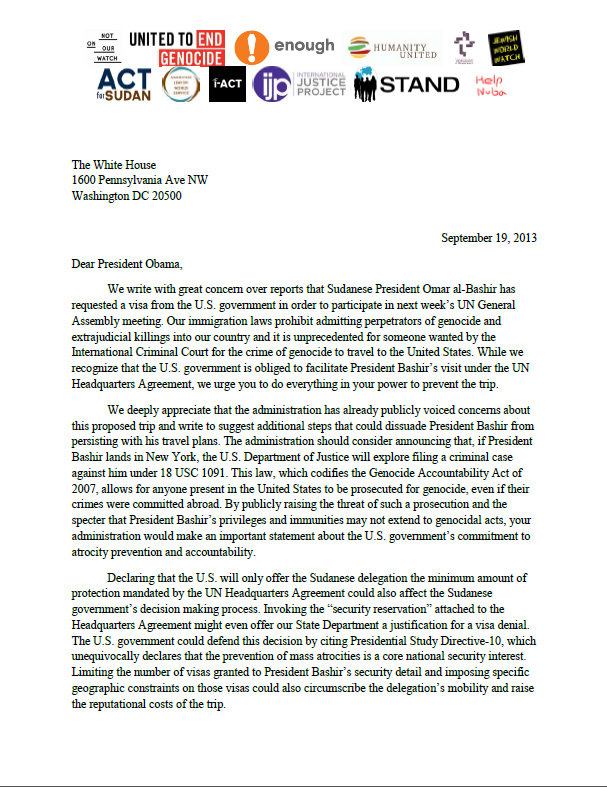
Dear President Obama,
We write with great concern over reports that Sudanese President Omar al-Bashir has requested a visa from the U.S. government in order to participate in next week’s UN General Assembly meeting. Our immigration laws prohibit admitting perpetrators of genocide and extrajudicial killings into our country and it is unprecedented for someone wanted by the International Criminal Court for the crime of genocide to travel to the United States. While we recognize that the U.S. government is obliged to facilitate President Bashir’s visit under the UN Headquarters Agreement, we urge you to do everything in your power to prevent the trip.
We deeply appreciate that the administration has already publicly voiced concerns about this proposed trip and write to suggest additional steps that could dissuade President Bashir from persisting with his travel plans. The administration should consider announcing that, if President Bashir lands in New York, the U.S. Department of Justice will explore filing a criminal case against him under 18 USC 1091. This law, which codifies the Genocide Accountability Act of 2007, allows for anyone present in the United States to be prosecuted for genocide, even if their crimes were committed abroad. By publicly raising the threat of such a prosecution and the specter that President Bashir’s privileges and immunities may not extend to genocidal acts, your administration would make an important statement about the U.S. government’s commitment to atrocity prevention and accountability.
Declaring that the U.S. will only offer the Sudanese delegation the minimum amount of protection mandated by the UN Headquarters Agreement could also affect the Sudanese government’s decision making process. Invoking the “security reservation” attached to the Headquarters Agreement might even offer our State Department a justification for a visa denial. The U.S. government could defend this decision by citing Presidential Study Directive-10, which unequivocally declares that the prevention of mass atrocities is a core national security interest. Limiting the number of visas granted to President Bashir’s security detail and imposing specific geographic constraints on those visas could also circumscribe the delegation’s mobility and raise the reputational costs of the trip.
In the event that President Bashir remains steadfast in his intent to travel to United Nations headquarters despite these actions, there are a number of steps that can be taken to impede his travel. Our diplomatic corps should encourage countries along President Bashir’s planned flight path to refuse landing rights for his aircraft for refueling and restrict access to their airspace. The U.S. delegation to the United Nations and Ambassador Samantha Power should also encourage senior UN officials and delegations from other countries to publicly refuse to meet with President Bashir or his delegation. Drawing on the precedent set by a similar rejection of former Iranian President Ahmadinejad in 2011, our diplomats could also coordinate a walk-out of the UN General Assembly session in protest of President Bashir’s presence.
Former President Bush paved the way to refer the situation in Darfur to the International Criminal Court, and your administration has increased U.S. cooperation with the Court, including facilitating the recent transfer of Bosco Ntaganda to the Hague. Since the UN Security Council acted under Chapter VII when urging all states to cooperate with the Court in Resolution 1593, and the Court has requested U.S. cooperation with President Bashir’s case in 2009, 2010 and most recently on September 18, 2013, we ask that the administration consider the impact that this trip has on our broader commitment to international justice and accountability.
As Americans concerned by the ongoing atrocities in Sudan, we support your administration’s thoughtful response to this unique diplomatic challenge. Along with the Sudanese diaspora, celebrity activists, human rights organizations, and student groups, we will be amplifying these efforts through our own public activism. The U.S. government’s continued attention to this issue will be instrumental in finding a holistic solution to the challenges facing the Sudanese people.
Sincerely,
George Clooney and Don Cheadle, Not on Our Watch
Mia Farrow, UNICEF Goodwill Ambassador
John Prendergast and Omer Ismail, Enough Project
Tom Andrews, United to End Genocide
Pam Omidyar and Randy Newcomb, Humanity United
Amir Osman, Sudan Democracy First Group
Ted Dagne
Bahar Arabie, Unite for Darfur
Jimmy Mulla, Voices for Sudan
Ruth Messinger, American Jewish World Service
Gabriel Stauring, iActivism
Eric Reeves, Smith College
Raymond M. Brown, International Justice Project
Faith McDonnell, Institute on Religion and Democracy
Michael Lieb Jeser, Jewish World Watch
Rabbi David Kaufman, Help Nuba
Eric Cohen, Act for Sudan
Esther Sprague, Sudan Unlimited
Sharon Silber, Jews Against Genocide
Eileen Weiss, New York Coalition for Sudan
Kimberly Hollingsworth, Humanity Is Us
Hannah Finnie, STAND

